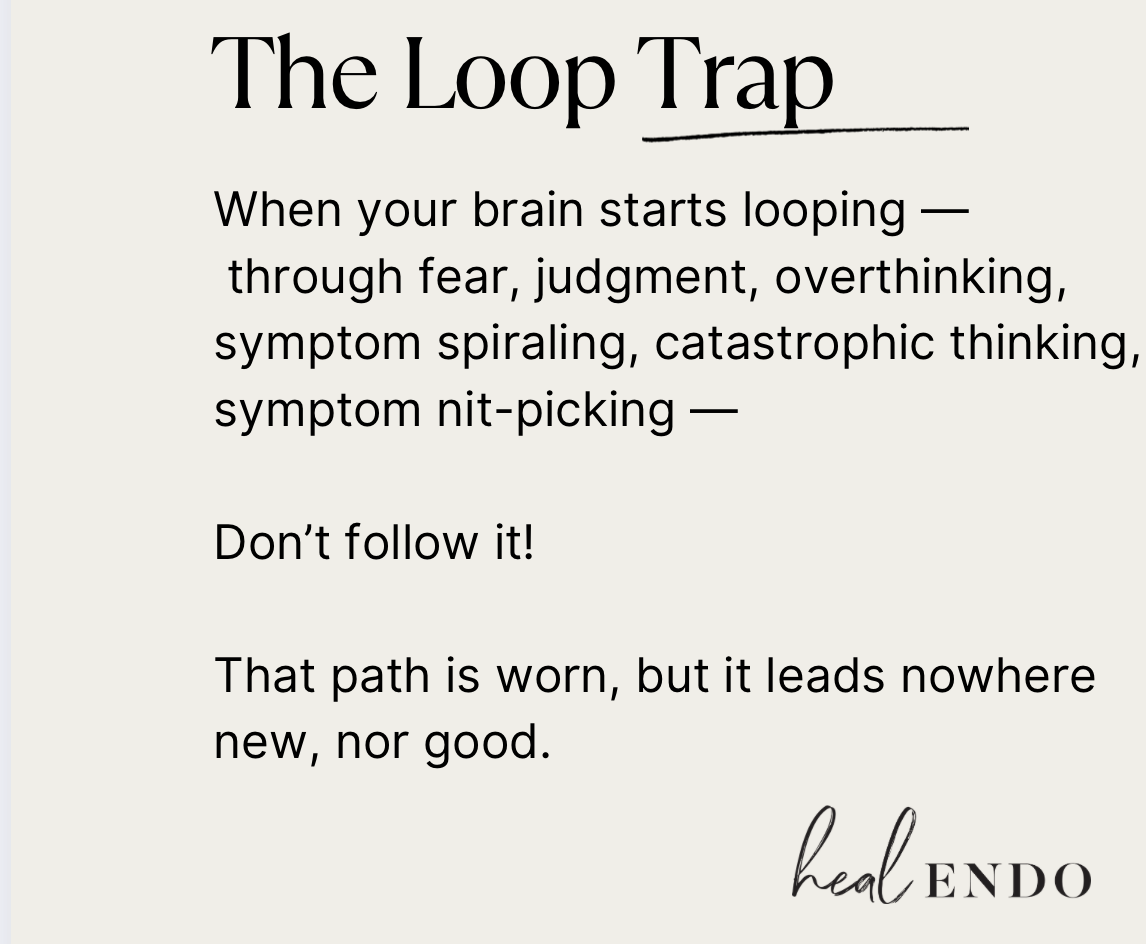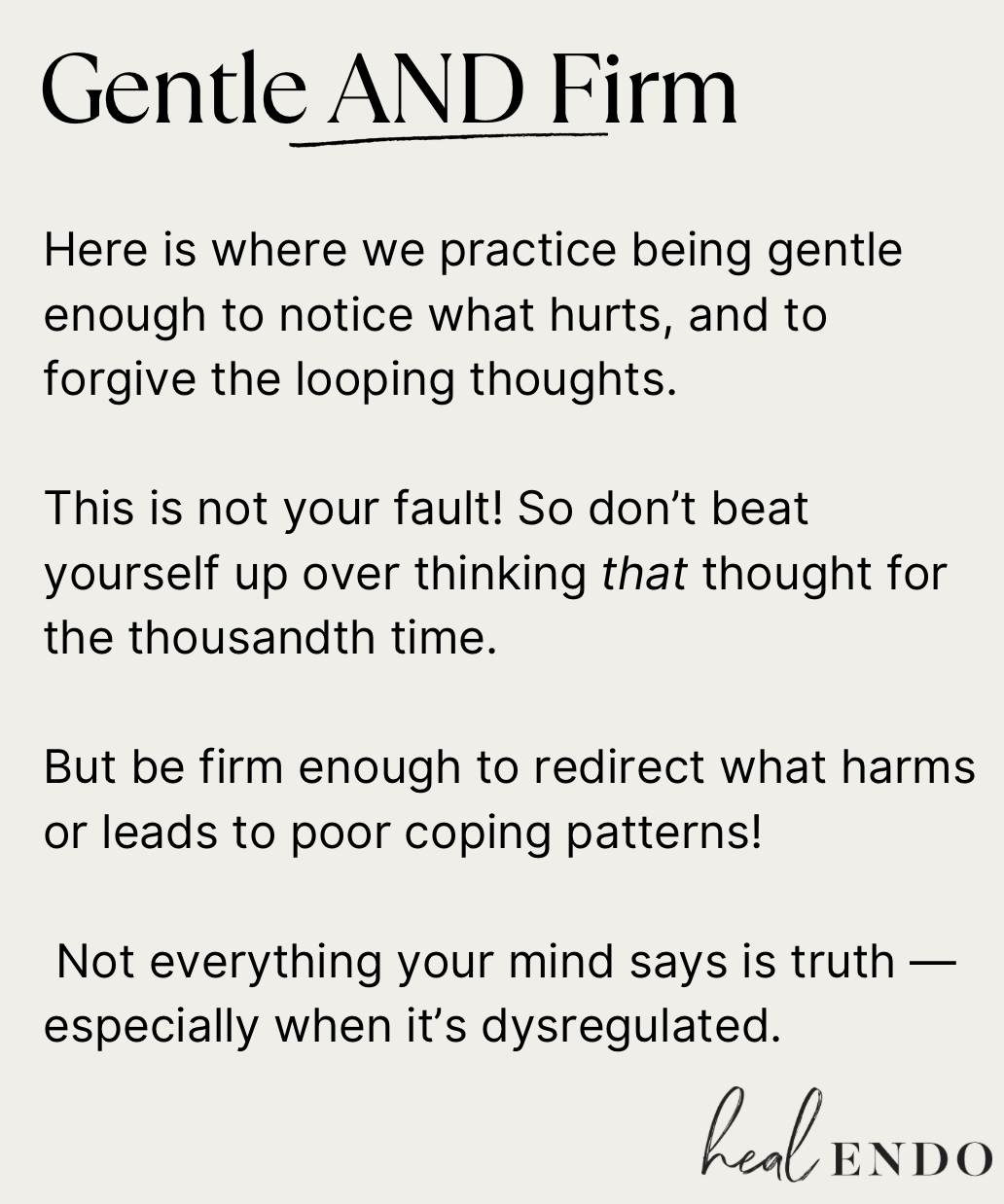Is Stress and Survival Mode Running the Endomtriosis Show? Be Gentle. Be Firm.
There was a time I thought I was just… wired this way. It was so normal for me to worry, ruminate, and move through life with urgency (even checking emails or making breakfast was urgent-paced, omg). My muscles were always tense. My jaw? Permanently tight. I could be on my couch, with a book, and still feel on edge.
But I didn’t call it trauma. Or nervous system dysregulation. I didn’t even call it stress. I called it me.
Maybe you relate.
Why you feel like you’re doing everything right — but your body still won’t cooperate. Maybe you’ve spent years trying to figure out why your hormones feel like they’re at war with you. Why your chronic fatigue doesn’t match your labs. Why your digestion shuts down at random. Why your pain is real but hard to pin down.
In fact, “doing it all” with little return is a hallmark sign of nervous system dysfunction and living in survival mode. Luckily, like any system, it can be retrained :)
Maybe it’s not Stress… it’s Dysregulation
If you’ve been diagnosed with endometriosis or another chronic illness, chances are you’ve heard a lot about inflammation. Heck, you probably read allll about it in my bestselling book Heal Endo: An Anti-Inflammatory Approach to Healing from Endometriosis. But what often gets missed is the very system running the show behind the scenes: your nervous system.
Your nervous system isn’t just about how “stressed” you feel. It’s the master regulator of your body — the control tower that sends signals to your immune system, hormonal system, digestive system, and more. It determines whether your reproductive system feels safe enough to ovulate or conceive. Whether your immune system is in repair mode or attack mode. Whether your gut can break down and absorb nutrients. Whether inflammation can resolve… or loop endlessly. And most importantly? It decides if you’re safe enough to heal.
Safety is the core of what’s called ventral vagal (formerly called parasympathetic mode). Traditionally referred to as “rest or digest mode,” this zone is truly more of an “am I safe now?” mode. Because when you’re safe, you no longer need to create stress hormones, you can turn back on digestive processes, turn off inflammation, and turn on mend, repair, and heal modes. Because, yes, your body is the one that mends and repairs itself (no supplement or biohack does that).
The Red Zone: Survival Mode in Disguise
The problem is, many of us live in chronic fight, flight, or freeze without realizing it. We think we’re just tired. Or anxious. Or overworked. Or maybe even lazy (that’s a fun little story internalized from society). We think we’re okay because we are resting from time to time. But beneath the surface, what’s often happening is this: your nervous system has gotten stuck in survival mode.
Survival mode is the opposite of parasympathetic, or safe. Here, your body prioritizes stress hormones for an energy boost, inflammation to attack, circulation away from vital organs, and the brain goes into full tunnel vision. This is great! If you’re in danger, that is. Indeed survival modes should come on fast and dimish quickly after the threat is over.
Problem is, we can get stuck here. This is referred to as nervous system dysregulation.
How Dysregulation Hides in Plain Sight
So what does it actually look like to live in a dysregulated state? Not just mentally — but physically, emotionally, hormonally?
You might find yourself in constant loops of fear, shame, or judgment. Maybe you feel urgency before you even open your inbox. Maybe your tolerance is paper-thin (and you find yourself reacting in a bad way rather than gently responding to life). Maybe you go from fiery to flatlined in minutes. Maybe your emotions rule the day — or maybe you feel numb to all of them.
On the physical side, the signs are just as clear — if you know how to read them. Chronic fatigue that rest doesn’t fix. Digestive symptoms that ebb and flow with no pattern. Hormonal shifts that feel erratic or extreme. Insomnia or shallow sleep. Random flares of pain. Sensitivity to sounds, smells, or stress. And a deep, nagging feeling that your body is always bracing for something… even when life is technically “fine.”
In the case of endometriosis, nervous system dysregulation can make the immune system hyperreactive, impair detoxification, and heighten inflammation — creating the perfect storm for pain, fatigue, gut issues, and hormone chaos to thrive.
Truly, it’s a BIG part of the picture for many of us. This isn’t your fault. And it’s not in your head. It’s in your wiring!
Sometimes it’s from old trauma, or childhood experiences where love and safety weren’t predictable. Sometimes it’s from relentless life stress — jobs, relationships, health issues — that never seem to let up. Sometimes it’s from physical triggers: poor sleep, blood sugar crashes, gut dysbiosis, nutrient depletion, or even chronic inflammation from endometriosis itself. But regardless of the cause, the result is the same: your body is no longer operating from a place of trust and restoration. It’s scanning for danger — all day long.
This Doesn’t Mean You’re Broken — you can retrain
And here's the hard truth: many of us don’t even realize we’re dysregulated. Because it doesn’t always feel like panic or trauma. It just feels like being on high alert. Like never fully landing in your body. Like thinking two steps ahead at all times. It becomes your normal.
In fact, your dysregulation might be so familiar — so baked into your identity — that you assume this is just your personality. “I’m just a worrier.” “I’ve always been a little high-strung.” “I’m just sensitive.” Even worse, we can be diagnosed with dysregulation and make it part of our identity! Yup, chronic anxiety or depression? Living in dysregulation at its finest.
For example, if you had asked me 10 years ago if I was stressed, I would have said “Nope.” I had a low-stress job, lots of free time, hobbies, friends, and nothing specific I though I had to stress about. I didn’t feel like I should be stressed, so why would I be?
But that’s the fallacy right there, thinking what we’re doing is akin to our stress levels. The reality is, it’s how we think, process information/stimuli, and respond to life that creates our stress response. You can be doing a lot and be stressed, or be doing a lot and, well, not be stressed. On the flip you can be doing nothing but relaxing at the beach or under the starts and feel nervous, jittery, and wired and urgent. It’s not about what we’re doing as much as if we’re doing it from a place of peace or a place of survival.
Here’s the good news: regulation is possible. It’s not a personality shift. It’s a physiological recalibration. And it’s absolutely something you can learn, no matter how long you’ve lived in survival mode.
What Regulation Actually Feels Like
But first, you need to know what regulation actually feels like.
Regulation isn’t just “calm.” It’s the ability to move through life with more adaptability. It means you can handle stressors — even big ones — without spiraling for day, wells, or even years. It means your hormones regulate more easily. Your digestion works. Your sleep is deeper. Your pain lessens. Your focus sharpens. Your energy rises. Your reactions slow down. You feel less like you’re surviving your day… and more like you’re living it.
You stop micromanaging. You stop people-pleasing. You stop obsessively googling every symptom and chasing every new protocol. You begin to trust your body again. Sounds pretty great doesn’t it?
How to Shift from Survival to Safety
If you’re wondering how to get there, what to do — I get it. And I want to be clear: this isn’t about one tool! It certainly isn’t about more supplements (so please don’t Google “adrenal fatigue supplements”). It’s not about forcing your body into a meditative state, or faking positivity, or biohacking your way to bliss.
Healing your nervous system is truly just as multifactorial as endometriosis is. There are many components that went into creating it, and many to heal from it. Moreover, none of our nervous system dysregulatinon is the same!! Just like htere are many types of endometriosis, there are different types of dysfunction. For example, some of you may deal with exhaustion, fatigue, and depression (stuck in a shutdown mode) whereas others of you may feel jittery, wired, and anxious (stuck in a stress response). Some of you may deal with this discomfort by overworking, pushing yourself without end, gossiping, and scrolling, while others may be so sensitive to every day stimuli you have quit your job and have become isolated.
Truly, there are many ways to be incorrectly reacting to the world, but the goal for all is to remember how to respon approproatey to situations.
Baby STeps: Start with the body
The cool thing about the nervous system is that it’s only 80% brain to body. That means your body is informing your brain and nervous system of danger more than your brain is! It’s how having a body full of inflammation, like with endometriosis, can contribute (if not create) dysregulation. It’s also why tools that heal the body can calm the dysregulation long before you touch it mentally.
This often starts with small, repeated cues of safety. Breathing that drops out of your chest and into your belly while you allow your shoulders to soften. Movement that shakes off adrenaline and sugar spikes. Food that stabilizes your blood sugar. Relationships that feel safe and true. Boundaries that give your system space to recover. Sunlight in the morning. Screens off before bed. Slowness that isn’t performative, but real.
If you have deeper muscular issues, you could address those. For me, correcting my tongue tie was huge! Deep fascia work, activating the deep core, reactivating proper breathing muscles, etc. This allowed the tension in my own body—that was keeping me hostage in a tight, wound-up way—to finally release.
Removing chemical overload is key, as they provoke “danger” cues in your body as much as work stress. Balancing blood sugar, lowering inflammation, increasing anti oxidants, increasing belly laughs, hugs and safe touching… all of these are safety cues for a body under siege.
Partnering with your Brain
The lifestyle “levers” are real — and powerful. But patterns are often hard to retrain without conscious thought. So if addressing the diet and lifestyle factors keeping your body stuck in danger mode aren’t helping… I get it. I personally was stuck in a deep state of dysregulation even after knowing (and doing) all the things to lower inflammation, pain, fatigue, and more.
This is where deeper work is necessary.
Noticing: Nervous system dysfunction means you can be pulled into the red zone when you shouldn’t, and stay there too long. So a great first step in re-wiring this response is noticing: What pulls you into red zone? Is there a place you are when it happens, like commuting or showering? Or is it a friend who you complain and gossip with that keeps you spiraling? Moreover, what helps you return to green? This is called a “glimmer,” when your body is kicked back into safety mode. It could be when you play with your dog, or do your hobby. If you don’t know, that’s okay. Most of us don’t. Not at first. But start noticing!
Re-directing: Once you notice what kicks you into red zone living, chances are you’ll already be mroe aware what your own red zone tendencies are. For me, it’s mental rumination and rehashing. For you it may be anger, or perhaps shutdown and retreat. When you’re aware this is happening, it’s up to you to immediately redirect the responce. As good as it feels to fall into that old pattern, as comfortable, the only way to rewire is to create new neural pathways to the opposite direction… and I’ll be honest this may feel like trying to turn a rusty wheel as first: nearly impossible. Be okay with that, it’s only because you need to wake up your nervous system parasympathetic mode.
What I learned in the DNRS program (a nervous system program that changed my own life) is to have a POPosite, a clever term to pop your intrusive thought with a neutral alternative. You can focus on counting the ABCs backward, or memorize and recite a poem. You can imagine a very vivid (so your whole brain is working) and happy memory, or tell yourself a story in an accent. In this way you’re concentrating on something else totally, something that is forcefully telling your body you are, in fact, safe. Because safe people laugh, tell stories, do silly things like say the ABS backwards. They have time to memorize poems and practice funny accents.
Strengthening: This is one of the biggest factors of DNRS that makes it so successful, and it’s spoken-out-loud visulations that force your body into safety, love, joy, and wellbeing. Speaking a memory out loud in vivid detail, or even a made-up memory (for example if you never had a grandma you can create a rich, detailed scenario about a grandma who loved you and brought you homemade cake on Sunday mornings), strengthens alllllllll those neural pathways to safetly. Because, fun fact, your body doesnt know the difference between when you think and what you do. So if you’re thinking worried, stressful thoughts, your body will react with red zone. But if youre thinking loving, healing thoughts your body will respond in kind.
The Nervous System: The Missing Link in Endometriosis Healing
Because here’s the thing: if you’ve had endometriosis (or another chronic condition) for a while, your body may have adapted to a high-alert baseline. Your immune system may be primed for threat. Your hormones may be cycling through chaos. Your gut may be sluggish, leaky, or inflamed. Your cells may be holding memories of stress you don’t even consciously recall.
And if all you do is treat the downstream symptoms — without addressing the upstream stress load — you’ll likely feel like you’re running in circles.
This is why the nervous system isn’t a luxury add-on to your healing journey. It’s the foundation.
When your nervous system softens, everything else becomes more possible. Fertility improves. Inflammation lessens. Hormones stabilize. Gut health improves. The body stops fighting its own healing.
And perhaps most importantly, you come back.




